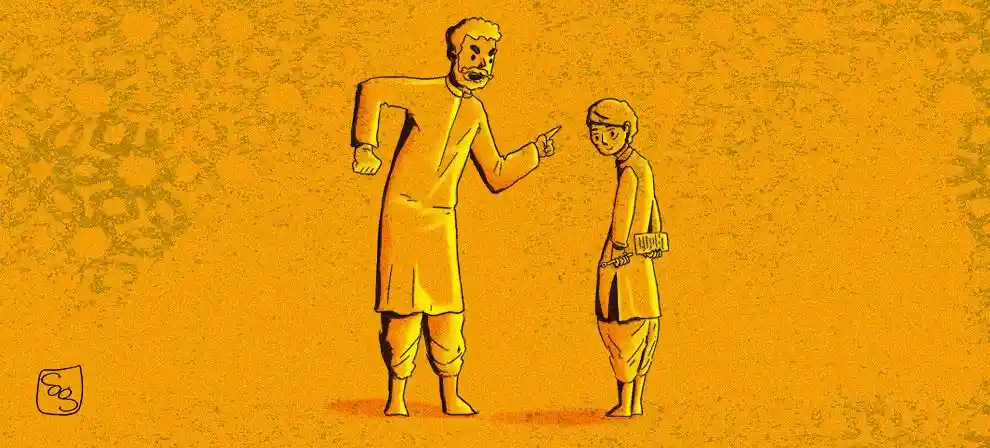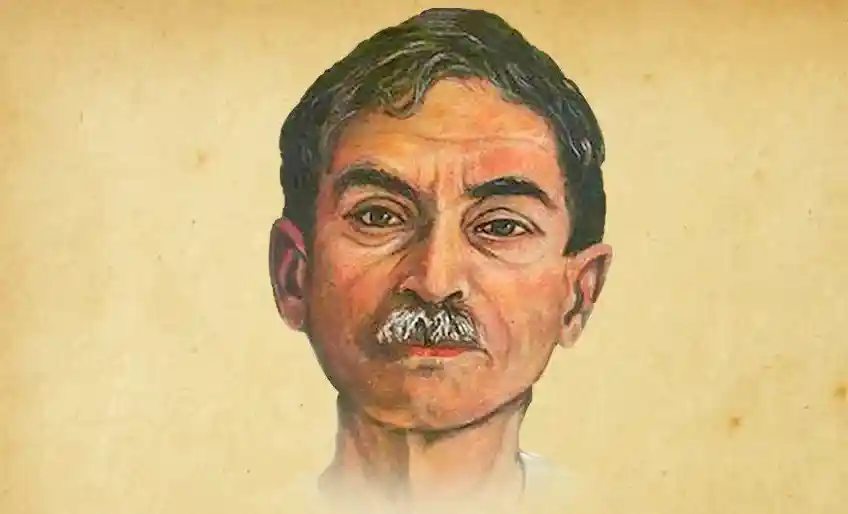Katha Samrat
The world of Hindi literature seems incomplete if the name Premchand doesn’t get mentioned. Any Indian you must’ve met would be lying if they haven’t come across his work at least once in their life. His works remain to be read vastly up until today and there’s no denying the fact that he was a brilliant writer with a cause.

Katha Samrat. Illustrated by Dishani Goswami: Visual Storyteller at ThisDay
Fact of the day: the renowned author was popular among his readers with three names. He was originally born with the name Dhanpat Rai Srivastav. For his first experience as a writer, he became the undergrounded Nawab Rai. But later after being caught and threatened of getting banned by the British officials, he became the much popular Munshi Premchand. A man with three names but a single motive: to write for a cause.
Premchand’s work is somewhat an epitome of creative imaginary along with the mentioning redundant social issues. He always took themes that were largely based on casteism, marginalized communities, post-industrialization effects, and nationalism. He considered words to be the most powerful medium for voicing opinions on what’s wrong and right within society. Having said that, Sunil Chandra (an author) mentioned in his article on the latter saying “Premchand often clung to the belief that no writer in a subject country could afford the luxury of writing without a social purpose.”
31st July 2021 marks his 141st birth anniversary. He was born in the year 1880 in the Lamhi village which was near Varanasi. He began his education when he was seven, at a Madrasa in Lalpur, and thus ended up learning Urdu and Persian from a maulvi. At the age of eight, his mother passed away. Premchand was then looked after by his grandmother who passed away as well. With his father working full time and his sister already married, Premchand ended up being a child who lost himself into the spiral of loneliness.
However, his solitary was soon comforted with the presence of books. Ever since then, his world was all about stories and novels. He sought salvation in fiction. This fascination that dawned upon him led his young self to work under a bookseller thinking of it as an opportunity to read books. Somewhere between reading stories and coming across various characters, Premchand had now started observing the people around him as the characters for his stories later.
Abiding by the same, Premchand wrote his first short novel titled Asrar-e-Ma'abid' which was largely based on his uncle who scolded him for reading fiction. The story was a satire on a young bachelor falling in love with a woman from a lower caste.
The story however never ended up getting published and thus got lost. While his journey of writing seemed to have started as an act of comical revenge on his uncle, it later became a characteristic of his realistic writing. He would borrow largely from the people who had an impact on his life and the surroundings he grew up in. Premchand's life was a struggle. He was married at the age of 15 when he was in ninth grade. He studied at the Queen's College of Benares and after a while, his father died. While he did manage to pass his matriculation exam, he couldn't qualify the school's eligibility to continue his studies further
He had to discontinue his studies after realizing he wasn't able to make the cut. He switched to teaching instead and by 1900, Premchand got a job as an assistant teacher at the Government District School, Bahraich, with a monthly salary of ₹ 20. His teaching took him to many places and therefore he ended up being in Allahabad. Here he wrote immensely for the Urdu magazine Zamana after having met with Munshi Daya Narain Nigam.
In 1907, India witnessed the first literary work under his pen name- Nawab Rai. It was published in the magazine with the title Duniya Ka Sabse Anmol Ratan.
Soon there were other short stories and novels namely Hamkhurma-o-Hamsavab, Kishna, and Roothi Rani. However, there was one work that led him to transition from Nawab Rai to Premchand. It was his collection of short stories called Soz-e-Watan. While his stories talked about all kinds of social issues and prejudices, they also had undertones of nationalism and patriotism.
Soz-e-Watan which comprised of four short stories strongly highlighted themes of nationalism, patriotism, and Indian freedom struggle. It was later identified by the British who in return decided to ban it. They considered it to be seditious and ended up burning 500 of its copies by raiding Premchand's house.
Then came Premchand. With a change in his name, he also changed the language he wrote in. He gradually became a Hindi writer. The first work that he published as Premchand was in Hindi with the name Saut. By then, he had gained fame in the Urdu literary world and was now vastly read. After this, many of his works emerged like Nirmala, Pratigya, Gaban, Karmabhumi, and with it, Premchand had made a lot of progress in his writing style.
Immensely inspired by Gandhi, Premchand had decided to leave his job as a deputy inspector of schools in order to voice his real opinion on nationalism through his writing. Thus he quit his job in the year 1921 and went ahead to pursue his passion full time. In this time period, he became an editor for many magazines, released his own magazine called Hans, became a school headmaster, and wrote many more stories.
Around 31st May 1934, Premchand tried his hand in the film industry. He ultimately wrote the script for the movie Mazdoor and ended up doing a cameo role in the film as well.
The film depicted the plight of labourers at that time and in return encouraged many labourers to strike against the injustice they faced. It even led the workers in Premchand's own loss-making Press Company to go on a strike and quit by the end. He had unknowingly penned down his own defeat while wanting to be expressible about the nation's fight. Therefore, with a high amount of debts on his head and a bad state of physical health, Premchand had reached his edge of life. He returned back to Allahabad only to hand over Hans to the Indian Literary Counsel and go back to Benaras.
On 8th October 1936, Premchand succumbed to death after suffering through a week of consistent sickness.
Godaan upanyasa was Premchand's last completed work before he passed away. He was the head of the Progressive Writers Association group and an eminent Hindi writer who had not only inspired but encouraged many to see the issues that go unnoticed. It is only right to remember him as the Katha Samrat.
Immensely inspired by Gandhi, Premchand had decided to leave his job as a deputy inspector of schools in order to voice his real opinion on nationalism through his writing. Thus he quit his job in the year 1921 and went ahead to pursue his passion full time. In this time period, he became an editor for many magazines, released his own magazine called Hans, became a school headmaster, and wrote many more stories.
Around 31st May 1934, Premchand tried his hand in the film industry. He ultimately wrote the script for the movie Mazdoor and ended up doing a cameo role in the film as well.
The film depicted the plight of labourers at that time and in return encouraged many labourers to strike against the injustice they faced. It even led the workers in Premchand's own loss-making Press Company to go on a strike and quit by the end. He had unknowingly penned down his own defeat while wanting to be expressible about the nation's fight. Therefore, with a high amount of debts on his head and a bad state of physical health, Premchand had reached his edge of life. He returned back to Allahabad only to hand over Hans to the Indian Literary Counsel and go back to Benaras.
On 8th October 1936, Premchand succumbed to death after suffering through a week of consistent sickness.
Godaan upanyasa was Premchand's last completed work before he passed away. He was the head of the Progressive Writers Association group and an eminent Hindi writer who had not only inspired but encouraged many to see the issues that go unnoticed. It is only right to remember him as the Katha Samrat.

Qalam ka Sipahi; Image Source: Zee News


